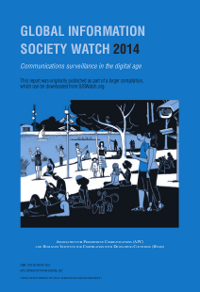 Vor einem Monat ist der Bericht Global Information Society Watch 2014 – Communications surveillance in the digital age erschienen. In diesem beschreibt Wolf Ludwig von comunica-ch im Kapitel All eyes on you das aktuelle Gesetzgebungsverfahren zum Überwachungsgesetz BÜPF. Zwei Abschnitte daraus:
Vor einem Monat ist der Bericht Global Information Society Watch 2014 – Communications surveillance in the digital age erschienen. In diesem beschreibt Wolf Ludwig von comunica-ch im Kapitel All eyes on you das aktuelle Gesetzgebungsverfahren zum Überwachungsgesetz BÜPF. Zwei Abschnitte daraus:
Besides some modifications to the first contested draft (May 2010), its new version appears to various stakeholders like new wine in old wineskins – basically sticking to new surveillance techniques undermining civil rights and liberties. Critical voices did not become silent: in February 2014, Digital Society Switzerland, a small but active group specialised in net policy, together with six other civil society groupings including Member of Parliament Balthasar Glättli (Green Party), launched a complaint against data retention in Switzerland. The federal office in charge, the Service for Surveillance of Post and Telecommunication Traffic (ÜPF), rejected the complaint – as expected – by arguing that “high legal barriers would protect fundamental rights.” The complainants appealed to the Federal Administrative Court. Meanwhile, in April 2014, the European Court of Justice (ECJ) declared the Data Retention Directive of the European Union “invalid” – a landmark ruling for many civil liberties groups all over Europe. The ECJ is backing key arguments of the Swiss complainants that existing practices for data retention “exceeded the limits imposed by compliance with the principle of proportionality” and calling it “a wide-ranging and particularlyserious interference with the fundamental rights of respect for private life and of the protection of personal data.”
Despite this revealing court ruling and broad opposition, the Swiss government and authorities drift between being unimpressed and stubborn. In March this year – just before the verdict – the Second Chamber of the Swiss Parliament (Ständerat), representing the cantons, gave its blessing to the BÜPF: 94% of the council’s members voted in favour, with only two votes against and four abstentions. Even some Ständeräte who had doubts caved in. Alexis Roussel, president of the Swiss Pirate Party, criticised the decision by concluding: “The Ständerat didn’t learn anything from the Snowden revelations.”
Der Bericht geht aber auch auf die Vorgeschichte und die Revision der Verordnung VÜPF ein und beleuchtet den aktuellen Stand zu einem möglichen Referendum. Der Text ist bestens geeignet, um an englischsprachige Personen weitergegeben zu werden.